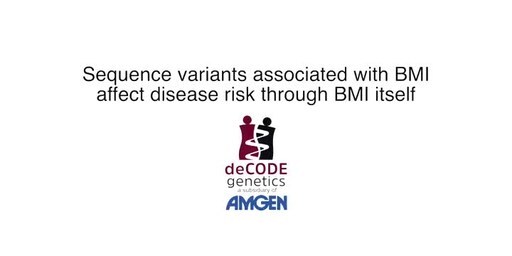deCODE Study Shows that Variants in the Sequence of the Genome that Contribute to Educational Attainment are Under Negative Selection
REYKJAVIK, Iceland, January 17, 2017 /PRNewswire/ --
In a study published today, scientists at deCODE genetics use genomic and genealogical data from across the population of Iceland over many decades to show that people who carry sequence variations linked to higher levels of education have fewer children than average. As a result, variations in the sequence of the human genome correlated with more education are becoming rarer in the population over time - that is, they are under negative selection in an evolutionary sense. The study is published today in the online edition of the Proceedings of the National Academy of Sciences (PNAS).
"These findings are an example of how we can use genomics to shed light on the evolutionary causes and consequences of observed social trends in modern human society," said Kari Stefansson, CEO of deCODE and one of the authors on the paper. "As a species, we are defined by the power of our brains. Education is the training and refining of our mental capacities. Thus, it is fascinating to find that genetic factors linked to more time spent in education are becoming rarer in the gene pool."
"In spite of the negative selection against these sequence variations, education levels have been increasing for decades. Indeed, we control the environment in which these genetic factors play out: the education system. If we continue to improve the availability and quality of educational opportunities, we will presumably continue to improve the educational level of society as a whole. Time will tell whether the decline of the genetic propensity for education will have a notable impact on human society," Dr Stefansson added.
This study leverages deCODE's unique and extensive genetics resources to document the change of the genetic propensity for education in 129,808 Icelanders over a period of many decades (1910 to 1990). The deCODE team calculates a polygenic score for propensity to educational attainment, POLYedu, as a weighted average of 620,000 sequence variations in the genome. The weights were derived from results of an association study that includes cohorts from the UK, US and the Netherlands. The polygenic score was then correlated with educational attainment, fertility, and birth years, using nationwide genealogical records.
Other notable findings in today's study include:
- The data reveals that the impact of higher POLYedu scores on fertility is due principally to delayed reproduction. In part, this is because individuals with high POLYedu scores delay reproduction to pursue education. However, it appears that higher POLYedu scores have a substantial effect on delayed reproduction that is independent of the actual education attained. The effect is stronger in women than men.
- POLYedu is correlated with a number of health and behavioral traits. They are positively correlated with longevity and HDL cholesterol levels, and negatively correlated with obesity, high-fasting glucose levels, and smoking. Thus, the decline of the genetic propensity over time has an effect on the population that is not limited to education.
Based in Reykjavik, Iceland, deCODE is a global leader in analyzing and understanding the human genome. Using its unique expertise and population resources, deCODE has discovered genetic risk factors for dozens of common diseases. The purpose of understanding the genetics of disease is to use that information to create new means of diagnosing, treating and preventing disease. deCODE is a wholly-owned subsidiary of Amgen (NASDAQ:AMGN).
Contact:
Jon Gustafsson
deCODE genetics
[email protected]
+354-664-1905
Edward Farmer
For deCODE genetics
[email protected]
+1-781-775-6206
SOURCE deCODE genetics
WANT YOUR COMPANY'S NEWS FEATURED ON PRNEWSWIRE.COM?
Newsrooms &
Influencers
Digital Media
Outlets
Journalists
Opted In






Share this article